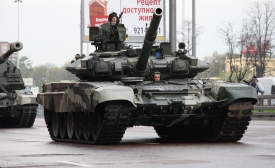ukraine
Lithuanian troops are teaching their British counterparts how to identify and fight Russia propaganda as part of an ongoing attempt to fight the country’s attempts to influence public opinion. Officers from the Baltic state – which is said to be at the front line of Russia’s “soft power” war in Europe – shared their experiences with the 77th Brigade, a new British Army unit set up to deal with information warfare.
We’ll get a view of our presidential election from journalists and academics from Ukraine and Georgia and from a journalism professor here in the U.S. We’ll talk about media independence and bias; how Mr. Trump and Secretary Clinton are viewed in eastern Europe; how the debate about Russian president Vladimir Putin is playing in Georgia and Ukraine and elsewhere.
Kateryna Smahliy, the director of the Kennan Institute in Ukraine and a moderator on one of the panels at the World Communication Forum Davos in Kyiv. Kateryna Smahliy reveals to the UT correspondent about the country's image abroad in the context of Ukraine's cultural diplomacy and a win-win strategy as a response to conflicts, which is the leading topic of the upcoming Conference.
Tensions are again mounting between Russia and Ukraine. Dubiously claiming provocation, Russia has stationed 40,000 troops on the Ukrainian border. Russian President Vladimir Putin has warned of a full-scale invasion.[...] What do Russians think of their government’s aggressive foreign policy? Is there anything our government could do to influence the Russian public’s perspective?

What do Russians think of their country's hawkish foreign policy?
In Russia, opinion polls are as important as, or possibly more so than, in democracies. [...] These opinion polls, in turn, reflect the information bubble created by the Russian government. For example, a survey conducted by the Russian Public Opinion Centerin 2014 found 80 percent of Russians supported Russia going to war to ensure that Crimea became part of Russia instead of Ukraine."
How do Ukrainians and Armenians who live around the world contribute to the communities where they have settled? How do they engage with their countries of heritage? If your family originally came from Ukraine or Armenia, share your stories by joining a webchat with others like you and with top U.S. diplomats. The chat will be held on September 8 at 9 a.m. EDT.
Fashion designers blended influences from the Arabian Desert, the Middle Eastern lifestyle and European trends at a catwalk show in Amman on Thursday, marking the 25th anniversary of Ukrainian independence. [...] fashion week aimed to broaden Jordanians’ understanding of the Ukrainian people and strengthen the connection between the two countries.







